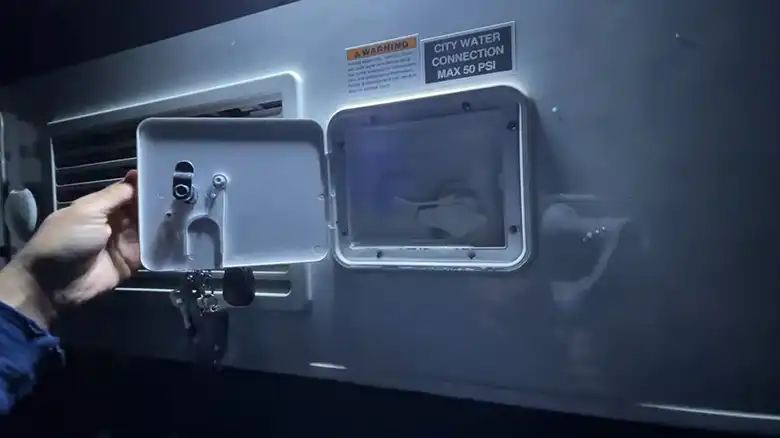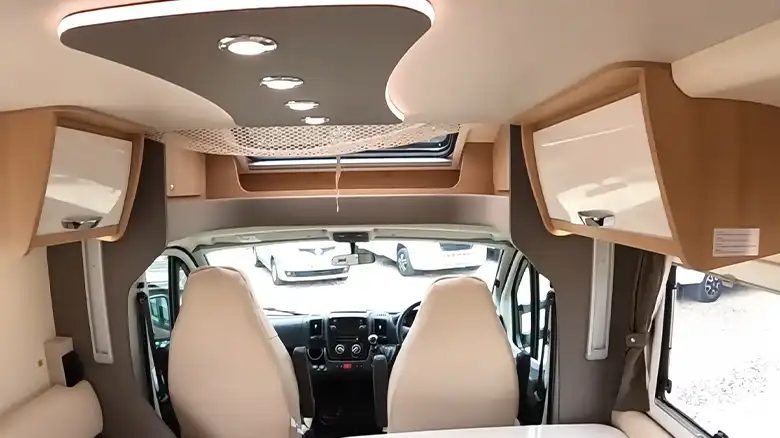Camping in a pop-up camper can be a fun adventure. However, musty odors caused by moisture, mildew, and mold can put a damper on the experience. These smells are unfortunately quite common in pop-ups since they are prone to condensation build-up when not in use.
The good news is there are ways to banish those unpleasant scents and make your camper fresh again. In this article, I’ll discuss several effective methods for removing musty odors from pop up campers. I’ll cover cleaning products and techniques to kill mold and mildew. I’ll also provide tips on moisture control and ventilation to prevent the smells from returning.
With a little elbow grease and the right supplies, you can get your camper smelling clean again in no time. Rest assured, you’ll be ready to head out on your next camping trip without having to hold your nose!

Finding and Preparing to Address Musty Smells
Before doing any cleaning, take time to inspect your camper and gather supplies. This prep work makes eliminating musty odors much easier.
Gather Necessary Cleaning Supplies
Having the right tools and cleaners on hand saves time. You’ll want gloves, rags, brushes, sponges, buckets, towels, and more. Stock up on disinfectants, deodorizers, detergents, vinegar, baking soda, and enzyme cleaners made for RV use.
Safety Precautions
Prioritize safety when addressing musty smells. Proper ventilation, gloves, and masks are important when using chemical products. Read all labels carefully and never mix cleaners. Have a fire extinguisher nearby just in case.
Identifying Key Problem Areas
Trace the musty smells to their sources. Damp, stained, or dirty spots usually hold the mold and mildew-causing odors. Check these pop-up camper trouble spots:
Fabric Surfaces: Upholstery, curtains, mattresses, and cushions absorb odors easily. Inspect for water stains or discoloration.
Carpets and Flooring: Musty carpets are a magnet for moisture and allergens. Feel for dampness underneath. Check vinyl and wood flooring for standing water or soft spots.
Storage Compartments: Food storage, closets, and cabinets can gather hidden dirt, spills, and mold.
Ventilation System: The AC, furnace, vents, and ducting may collect dirt, dust, or mildew that smells when the fan runs.
Deep Cleaning and Freshening the Camper Interior
Once you find the sources of musty odors, it’s time to thoroughly clean and deodorize the camper interior. Follow these tips for freshening up key areas.
Fabric Surfaces
Upholstery, curtains, linens, and other soft goods need a deep clean to banish odors.
- Upholstery and Curtains:
– Vacuum fabric to remove loose dirt and debris.
– Use a fabric-safe detergent or upholstery shampoo with an odor neutralizer. Avoid soaking the material.
– Rinse with clean water and let the air dry fully before putting furniture back together.
- Bedding and Cushions:
– Wash all bedding, pillows, mattress covers, and cushions in hot water with an enzymatic cleaner. Add borax or bleach if permitted.
– For mattresses, sponge clean with an RV mattress cleaner and deodorizer then let dry completely. Place a moisture absorber between the mattress and cushions.
– Air out cushions in the sun; stuff with newspaper to absorb moisture.
- Washing Machine Tips:
– Add white vinegar or baking soda along with detergent to kill odors in the wash.
– Leave the door open between washes so the drum dries out fully.
– Run empty “rinse and spin” cycles to remove residue and smells.
- Sun-Drying: Hanging fabrics outside in the sun naturally disinfects and freshens them. The sun’s UV rays kill mold and mildew.
Carpets and Flooring
Eliminating musty smells from carpeting involves intensive cleaning and drying of the padding underneath.
- Vacuuming and Deep Cleaning:
– Vacuum carpets thoroughly with an upright or wet/dry shop vacuum. Dispose of the contents outside immediately.
– Rent a carpet shampoo machine and use hot water, detergent, and an RV carpet cleaner. Extract any standing water.
– After drying fully, sprinkle a thin coat of baking soda to absorb odors. Vacuum again after several hours.
- Use of Carpet Cleaners or Deodorizers:
– Spray vinegar or enzyme cleaners made for RV carpeting. Let soak before blotting up moisture.
– Apply an odor eliminator product to neutralize smells. Borax can also help remove musty smells long-term.
Storage Compartments
Clear out and clean cupboards, closets, and other storage areas identified as smell sources.
- Remove and Clean Items Inside: Take everything out of the compartments and clean the contents before returning them. Wipe down any spills or food stains.
- Wipe Down Surfaces with Appropriate Cleaners: Use a disinfectant designed for RV use on interior walls, floors, and shelves. A bleach-based cleaner works well on mold.
Ventilation System
Musty ductwork gets blown through the entire camper. Clean all vents, filters, and units that circulate air.
- Cleaning Air Vents and Filters:
– Remove moldy duct filters and replace them with new ones. Clean out air vents with a small brush and vacuum.
– Wipe down return air vents and fan housing with antimicrobial cleaner. Rinse surfaces afterward.
- Checking for Mold in the Ventilation System: Inspect inside ducts with a flashlight for obvious mold. You may need a pro to fully disinfect the system if mold has spread extensively.
Alternative Solutions for a Fresh-Smelling Camper
Here are some alternatives that can improve your camper’s air environment:
Dehumidifier
- Creating a Dry Haven: In the battle against musty odors, a dehumidifier emerges as a formidable ally. Running a small dehumidifier in your camper proves effective in tackling excess moisture. Extracting dampness from the air, it not only aids in preventing mold and mildew but also contributes to a drier and more comfortable interior.
- Regulating Humidity Levels: Dehumidifiers play a crucial role in regulating humidity levels, especially in environments where condensation is prone to occur. Their ability to remove excess moisture not only combats musty smells but also promotes a healthier atmosphere within the camper.
Febreze Air
- Neutralizing Odors with a Fresh Touch: Febreze Air stands as a reliable solution for neutralizing odors and infusing a breath of fresh air into your camper. Its innovative formula doesn’t just mask unpleasant smells; it effectively eliminates them, leaving behind a pleasing and subtle fragrance.
- Versatile Odor Elimination: From cooking odors to the remnants of outdoor adventures, Febreze Air can tackle a spectrum of smells. This versatile product ensures that your camper remains an inviting space by eradicating odors rather than merely covering them up.
Wax Melter
- Fragrance Without Flames: While a wax melter comes with a disclaimer—never leave it unattended—it presents a charming alternative to candles. When used with caution, a wax melter can emanate the inviting aroma of candles without the safety concerns associated with open flames.
- Customizable Scents: Wax melters offer a variety of scented wax options, allowing campers to personalize the fragrance in their living space. Whether it’s the soothing scent of lavender or the warmth of vanilla, wax melters provide a customizable olfactory experience.
Dryer Sheets
- Aromatic Bug Deterrent: Beyond their traditional use in laundry, scented fabric dryer sheets can serve a dual purpose in your camper. Strategically placing these sheets around the interior not only imparts a pleasant aroma but also acts as a deterrent for certain types of insects.
- Convenient and Cost-Effective: Dryer sheets are a convenient and cost-effective way to enhance the scent profile of your camper. Their lightweight and portable nature makes them an ideal option for those looking to effortlessly elevate the olfactory ambiance of their mobile abode.
Common Causes of Musty Odors in Pop-Up Campers
Musty odors in pop-up campers typically stem from excess moisture accumulating inside the enclosed space. Here are some common reasons:
Moisture Accumulation
Condensation from breathing, cooking, and other activities adds humidity to the air over time. Without proper ventilation, this moisture saturates soft furnishings, carpets, and even walls in a pop-up camper. Damp conditions breed mold and mildew growth.
Mold and Mildew Growth
If moisture lingers, mold spores can take hold and multiply quickly. Mold infestations in campers often occur in hidden places like under carpets, behind cabinets, and inside cushioning. The musty smell of lettuce you know mold is present.
Stale Air Circulation
Without fresh air exchange, the interior air becomes stale and takes on odors. Running the AC can make condensation issues worse. Infrequent usage also allows smells to build up.
Spills, Leaks, or Water Damage
Leaks from rain, plumbing issues, or spills can cause excess moisture. Water damage often promotes heavy mold growth. Damp spots will keep smelling musty until thoroughly dried out.
Outdoor Humidity and Rain Getting Inside
External factors like high outdoor humidity and rain entering the camper can exacerbate moisture-related issues. Proper sealing and maintenance are essential to keep the elements at bay.
Preventing Musty Odors Long-Term
Once you’ve succeeded in removing that funky odor, take steps to keep it from coming back after your hard work.
- Addressing Moisture Issues
Excess moisture is the root cause of recurring musty smells. Here’s how to keep things dry:
a. Using Dehumidifiers: Running portable dehumidifiers when not using your camper keeps humidity levels down. Try models with auto shut-off for safety.
b. Proper Ventilation Practices: Crack windows for air circulation whenever possible. Always run the exhaust fan when cooking or showering. Open roof vents prevent condensation buildup.
- Regular Cleaning Routine
Don’t let dirt and spills accumulate. Do surface cleaning often between deeper cleaning sessions.
a. Scheduled Cleaning Sessions: Do a thorough camper cleaning at least 2-3 times per year or every few months. Target all textiles, carpets, mattresses, and soft surfaces.
b. Storing the Pop-Up Camper Properly: Before winter storage, go through the entire deodorizing process. Add moisture absorbers and leave cleaning products inside for use next season.
Extra Tips and Important Considerations
a. Natural Remedies for Musty Smells: Baking soda, white vinegar, borax, and activated charcoal can help absorb musty odors without harsh chemicals. Open air drying and sunlight also remove smells naturally.
b. Professional Services if the Issue Persists: For severe mold issues or smells that won’t go away after thorough cleaning, consider hiring an RV technician. They have commercial products and tools to fully eliminate odors.
c. Storage Tips for Off-Season Periods: When not camping for extended periods, park with the pop-up roof down. Make sure the interior is completely dry beforehand. Use moisture absorbers and ventilate by partially opening windows.
Final Thoughts
Musty odors in pop-up campers can be eliminated by thoroughly cleaning, disinfecting, and deodorizing the interior. Controlling moisture and ensuring proper ventilation will prevent the smells from returning. With some diligent cleaning and moisture prevention, you can keep your camper fresh and enjoyable for all your future camping adventures.


